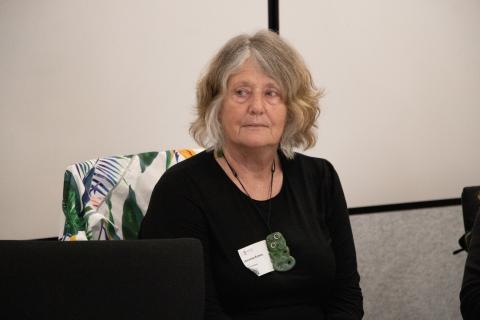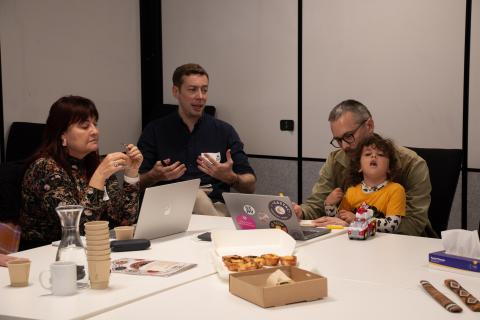


The First Nations Knowledge Network is a space for researchers and end-users working on First Nations focused research to connect. Established in 2024, the Network facilitates knowledge sharing on how to conduct research and research translation for the empowerment, inclusion and self-determination of First Nations communities.
In this blog, George Goddard, Node Research Manager at Natural Hazards Research Australia, describes the momentum the Network has following its second in-person gathering on 17 – 18 June 2025, before the Natural Hazards Research Forum 2025.
We purposefully held an in-person session, First Nations Knowledge Network Day, on Kaurna Country the day before our Natural Hazards Research Forum 2025 to help start further yarns throughout the Forum about the research including the following projects currently underway:
The First Nations Knowledge Network welcomed special guest mentor, Christine (Cassie) Kenney, Distinguished Professor of Disaster Risk Reduction at Massey University and Director of Te Toi Whakaruruhau o Aotearoa, New Zealand’s Māori Disaster Research Centre. Cassie reflected on her experience supporting the empowerment and active participation of Māori researchers in global networks. Helping us stretch our thinking further, we were also joined by Kataya Barrett who shared her insights as she works with the New South Wales Bushfire and Natural Hazards Research Centre to develop a First Nations strategy.

Several First Nations end-user representatives joined the conversation with Cherie Minniecon and Chloe Swiney from the Queensland Fire Department sharing about the First Nations women, cultural fire knowledge, wellbeing and memory project. Pathways Group member Kylie Jacky also attended online to listen and share personal reflections from the inaugural Pathways group meeting in May 2025.
This diverse gathering unsurprisingly contributed to rich conversations around the opportunities and challenges to ensuring this vital research leads to meaningful change in practice and policy, themes that resonated throughout the Forum.
Part of the discussion was the difference between information and understanding. We discussed how research generates rich insights and information but how even when we get the information to the people who can help change things, we need them to not just have this information but a deep understanding and context of how to support appropriate change and the empowerment of First Nations rights-holders
This key theme of trust and relationships is foundational to genuine understanding and collaborative action. Both these things require the time to move at the speed of trust and build meaningful relationships. I noted this could be challenging if relationships are not fully valued.
I was encouraged to see the themes of relationships, trust, understanding and respect woven throughout this year’s Forum. Notably most strongly through the presentations of the Knowledge Network Members but also keynote presentations of Christine Kenney, Tianhi Adamson, Oliver Costello and Mark Duckworth, who spoke to the imperative need and challenge of engendering trust between governments and communities more broadly.

The research projects previously mentioned tell a story of the creation of trusted relationships, mutual understanding and respect in the sector. These examples and this progress also came through in the Workforce – leadership connections presentation and panel session on the Forum’s second day. Pathways Group member David Windsor reflected on his experiences as Cultural Fire and Partnerships Coordinator for the Bushfire Centre of Excellence at the Department of Fire and Emergency Services, Western Australia. He shared how they are seeking to empower First Nations communities to practice cultural fire in a genuine collaboration to empower communities to care for Country, rather than seek to extract the knowledge so that non-Indigenous practitioners can undertake it.
Moving forward, the Centre will reflect on the ways we can support the research insights from this First Nations Network to ensure they are available and used by those who can make a difference in a way that engenders genuine understanding and commitment. How can we support the trusting relationships required to do this? This is a critical theme that will be carried forward as we work with the First Nations Pathways Group and the Knowledge Network to develop a First Nations Strategy.
Huge thanks to all First Nations Knowledge Network members and guests for your engagement, generosity and wisdom and for being powerful voices for inclusion and self-determination.